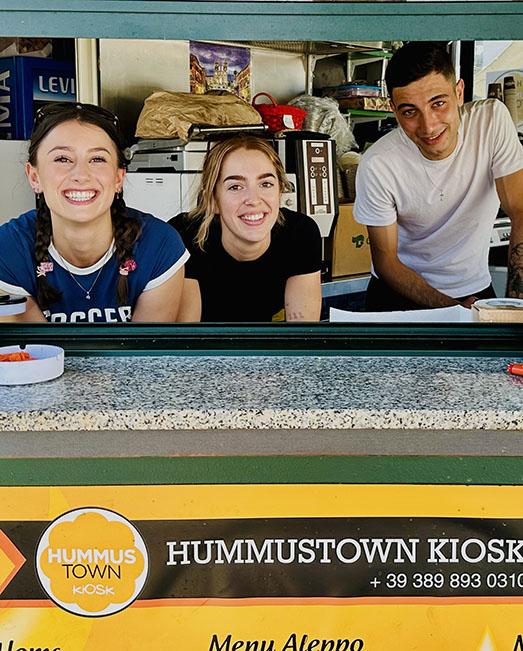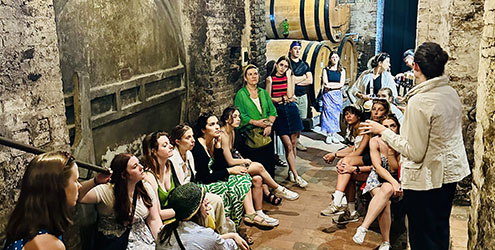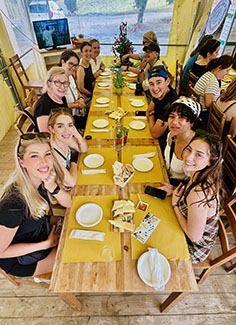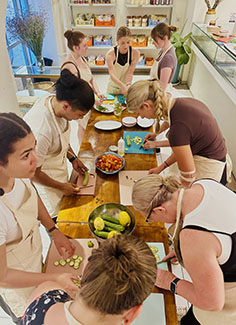Study
Copyright@ Australian Catholic University 1998-2026 | ABN 15 050 192 660 CRICOS registered provider: 00004G | PRV12008
Copyright@ Australian Catholic University 1998-2026 | ABN 15 050 192 660 CRICOS registered provider: 00004G | PRV12008

It would be stating the obvious to remark that Rome boasts a rich history, with iconic monuments, inspiring art, theatrical streets and atmospheric neighbourhoods. But international visitors often miss the best of the city’s culinary culture, instead falling into the tourist traps that are dotted around its most popular sites.
Eating like a local was therefore a must for the 22 students who visited Rome as part of the ACU Rome: Food, Culture and Community Engagement study tour in mid-2023.
From the relative calm of their base at ACU’s Campus di Roma in Monteverde, above the bustling district of Trastevere and with easy access to Rome’s Centro Storico, the students developed a deep understanding of local food traditions.
“Monteverde is in the perfect position,” says Sharon Croxford, Associate Professor of Nutrition and Dietetics at ACU, who led the group on the two or three-week immersion. “It’s not touristy but it’s literally a 10-minute walk down to Trastevere, and even in the neighbourhood itself you have access to alfresco dining, traditional trattorias, and restaurants filled with locals.”
On top of the ‘to-try’ list was the four classic Roman pasta dishes – cacio e pepe, carbonara, amatriciana, and alla gricia – each with a distinct history and folklore.
“Romans love their pasta, so we exposed the students to the key stories of the city and its food and wine culture,” Associate Professor Croxford says. “Rome has a very particular pasta culture, and that makes it really interesting to tap into these stories as a way of learning about the place and what makes it so special.”
The Rome tour wasn’t all about sampling culinary treats. There were language classes, guest lectures, and visits to farms and produce markets to learn about the city’s approach to food sustainability.
“We did lots of different community engagements, from things like food rescue in markets with a group called ReCup, where we rescued produce that might go to waste and redistributed it to people in need, and also cleaning rubbish, planting trees, and developing playgrounds around market sites with Retake Roma,” says Associate Professor Croxford, noting the positive response that the students got from locals.

In an ancient Tuscan wine cellar.
“So many Romans stopped to personally thank the students, and that was just extraordinary and very gratifying.”
Students also spent time at Paver Agus, a vineyard and fruit farm on the outskirts of Rome that only employs refugees and migrants, and Il Trattore, a social cooperative that employs people with health and disability issues.
They also learned that modern-day Romans are starting to open their palates to new foods and flavours.
“Our Master of Dietetic Practice students worked shifts at a kiosk near Rome Central Station, working with Hummustown, an organisation that has brought Middle Eastern food to Rome while also supporting Syrian refugees as they transition to life in a new city,” Associate Professor Croxford says.
“This type of activity teaches students about integration of new cultures and cuisines, which is really common here in Australia where we have different ethnic groups and access to food from all over the world, but it’s only really emerging in Rome.”
After a week of roaming around Rome in the sweltering heat, the ACU cohort took a trip to Tuscany, learning about cheese and wine in Pienza and Montepulciano, and finishing the day in Florence.
For some students, getting out of the city and witnessing the rolling hills and old towns of the Tuscan countryside was a clear highlight.
“We had students who had never travelled overseas before,” says Associate Professor Croxford. “They were getting their first passport to travel for this trip to Italy, and for them, Tuscany was a magical experience.”
Students learnt that Pecorino di Pienza is a recent tradition from the 1950s and ‘60s, whereas the Roman version of the sheep’s milk cheese graced the tables of ancient emperors. In Montepulciano, they visited cellars from both the Renaissance and Etruscan times, practicing their wine-tasting skills.


Tasting Pecorino di Pienza and cooking at Pandali.
“Experiencing ‘la dolce vita’ firsthand is something I will never forget,” says Natalie Hayllar, a qualified dietitian who is currently studying for ACU’s Graduate Certificate in Culinary Nutrition Science.
So, what was the highlight of the tour?
“I cannot choose just one, there are too many,” Natalie adds. “The cheese and wine immersion in Tuscany was spectacular, local market visits and cooking classes with Alice Adams and Pandali, and the walking tour of the Roman Jewish Quarter, not to mention the guest lecture from Professor Charles Spence from Oxford University on ‘gastrophysics’.”
Among those on the tour were undergraduates studying the Bachelor of Nutrition Science and Bachelor of Applied Public Health, and postgraduates enrolled in the Graduate Certificate in Culinary Nutrition Science and the Master of Dietetic Practice. In future, says Associate Professor Croxford, the faculty hopes to broaden the Rome study experience to include students from a wider array of health sciences courses.
“We really want an interdisciplinary group of students to come on these overseas tours because it helps to broaden perspectives of the students themselves, and that opens up the potential for new and exciting learning and community engagement experiences,” she says.
“Many students described the Rome study tour as life-changing, and at the end of it they come up to you and say, ‘This is it. Now I know exactly where my career is going.’ They get an opportunity to immerse themselves in a different culture, so they return home with new experiences, and maybe even a new perspective.”
Keen to explore a career in nutrition or dietetics at ACU? Explore the options.
Learn more about studying at ACU’s Rome Campus.
Copyright@ Australian Catholic University 1998-2026 | ABN 15 050 192 660 CRICOS registered provider: 00004G | PRV12008